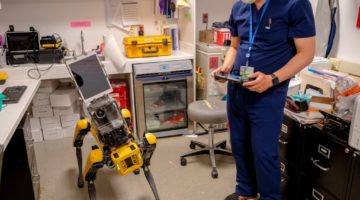
Hoping to prevent opiate tolerance and addiction, BWH recently completed a pilot study using digital pills to track opiate use in patients with acute fractures.
The ingestible biosensors have tiny batteries and transmitters that send digital messages to prescribers immediately after a medication has been ingested. The device monitors patients’ use of pain management drugs in real time, according to Ed Boyer, MD, PhD, of BWH’s Division of Medical Toxicology.
“Nonadherence to medications or using medications in a manner other than prescribed poses risks to patients, such as disease progression and addiction,” says Boyer, who worked with Peter Chai, MD, MMS, to study ways to prevent adverse drug events, toxicity, drug interactions, poisoning, and drug overdose.
Once the pill reaches the stomach, where it dissolves, chloride ions activate the radio transmitter that sends a signal to a receiver where the type of medication, the number of pills taken, and time of ingestion is recorded. The information is then relayed to a cloud-based server that delivers a message to the prescriber within 5 to 10 minutes of ingestion.
Chai says the timing of this invention is critical, especially in light of recent data from the Centers for Disease Control and Prevention about the risk of long-term opioid addiction in patients who have even short courses of oxycodone.
“These data are important as we continue to have more careful and directed conversations regarding the expectant management of pain and the dangers associated with opioid use,” he says. “This is the technology I’ve been waiting for.”










